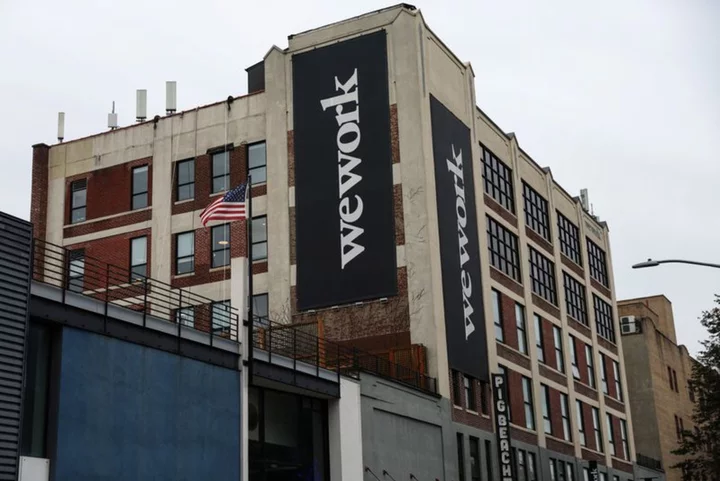(Reuters) -Flexible workspace provider WeWork sought U.S. bankruptcy protection on Monday, crippled by a large debt pile and soaring losses due to lower demand for office space from cost-conscious customers.
WeWork was once the most valuable U.S. startup, worth $47 billion. It courted investments from blue-chip investors, including SoftBank and venture capital firm Benchmark, as well as major Wall Street Banks including JPMorgan Chase.
The following explains WeWork's meteoric rise and fall that reshaped the office sector globally:
What is WeWork?
WeWork, founded in 2010, aimed to revolutionize the office market by taking long leases on large properties and renting the space to multiple smaller businesses on more flexible, shorter arrangements. It was seen as a disruptor with a business model unhindered by property ownership. It expanded at breakneck speed, which increased revenue but also racked up steep losses.
Who are the company's founders?
Adam Neumann, his wife Rebekah Neumann, together with Miguel McKelvey founded the company and helped it grow to be the most valuable U.S. startup worth $47 billion. WeWork's brand was strongly tied to the flamboyant, freewheeling Israel-born entrepreneur, who had said that his company's mission was to "elevate the world's consciousness."
However, Neumann's pursuit of swift growth at the expense of profits and revelations about his eccentric behavior led to his ouster and the derailment of an initial public offering in 2019.
Just before WeWork filed for bankruptcy this week, Neumann said, "I believe that, with the right strategy and team, a reorganization will enable WeWork to emerge successfully."
"The company was the product of a boom, and during booms, investors ignore the flashing warning lights. 'Charismatic CEO' is a term that should strike fear into any investor's heart," said Steve Clayton, head of equity funds at Hargreaves Lansdown, on Tuesday.
How did WeWork's fortunes plummet?
WeWork's dramatic fall followed lavish predictions about its prospects from SoftBank founder Masayoshi Son.
WeWork first tried to launch an IPO with Neumann as chief executive in 2019, with its parent, We Company, spending months preparing for the public offering. The proposed share sale imploded spectacularly after investors questioned the company's hefty losses and balked at Neumann's management style and corporate governance lapses.
By 2021, estimates of WeWork's value had fallen as low as $10 billion. The company finally went public through a merger with a blank-check acquisition company in October of that year.
The company's rise and fall was turned into a television series "WeCrashed," starring Oscar winners Jared Leto as Neumann and Anne Hathaway as Rebekah.
Why did WeWork seek U.S. bankruptcy protection?
The company grappled with expensive leases and corporate clients cancelling agreements as vast numbers of people started to work from home after the COVID-19 pandemic. The company worked to amend its leases and restructure its debts, yet this was not enough to stave off its bankruptcy.
"Innovative financial metrics are rarely truly innovative, instead being a way of disguising a lack of cash profits, and WeWork played that game for all it was worth," Clayton said.
As of the end of June, WeWork's long-term lease obligations were $13.3 billion - a crippling burden for the company in the post-COVID plunge in demand for office space.
What is next for the company?
WeWork said on Monday about 92% of the company's lenders had agreed to convert their secured debt into equity under a restructuring support agreement, wiping out about $3 billion of debt.
"WeWork could use provisions of the U.S. bankruptcy code to rid itself of onerous leases," law firm Cadwalader, Wickersham & Taft LLP said in a note to landlords on its website in August.
Sam Stovall, chief investment strategist of CFRA Research said, "I would not be surprised if SoftBank is simply trying to get as much of its own investment out of the company before it joins Titanic at the bottom."
The global commercial property lending market could be in for a rough 2024, as vacancies are expected to climb in the coming months. Overall real estate values have dropped sharply due to weak demand and investor reluctance to invest.
(Reporting by Kannaki Deka and additional reporting by Susan Mathew in Bengaluru; Editing by Anil D'Silva)

